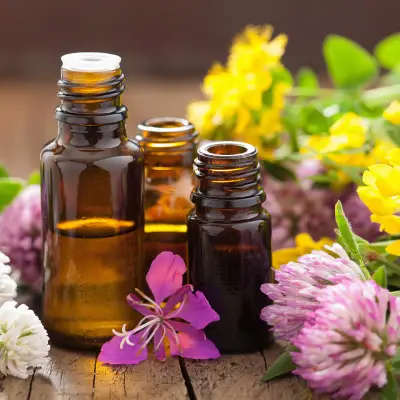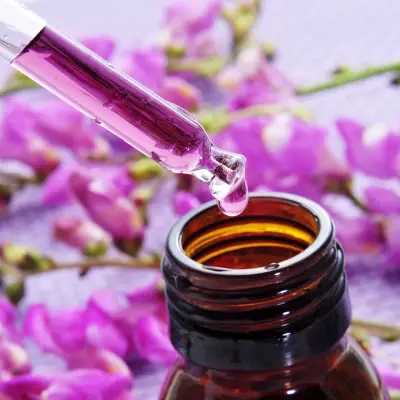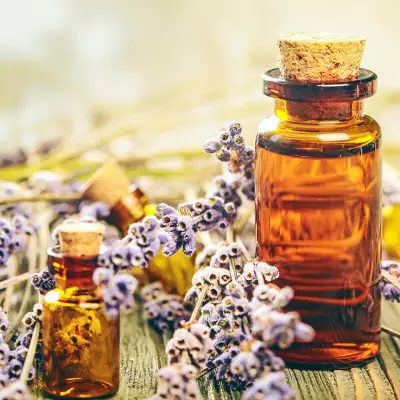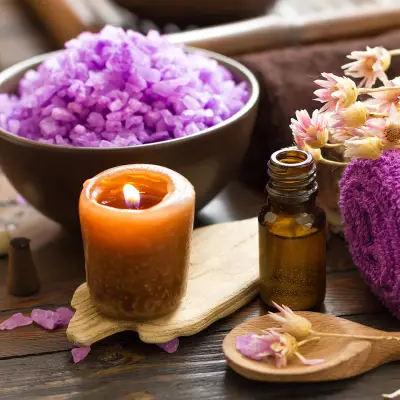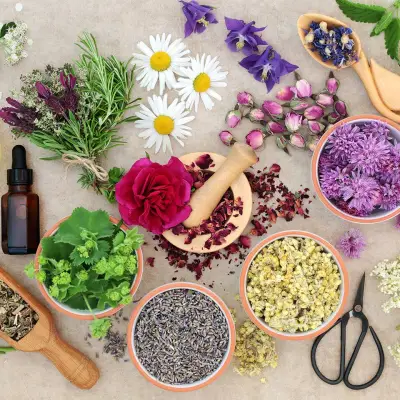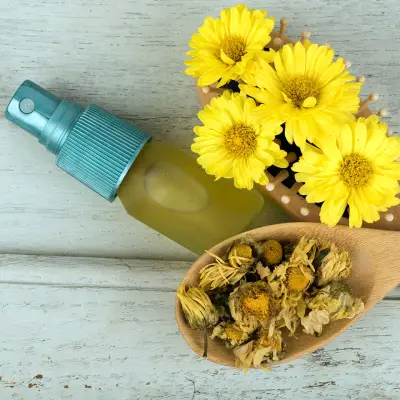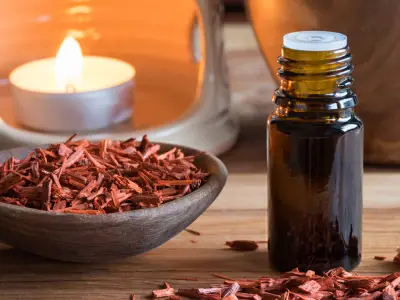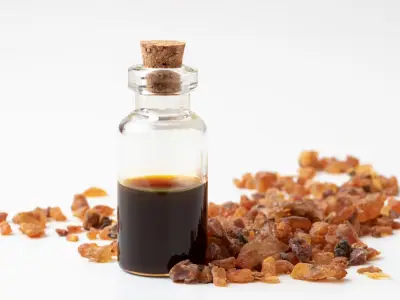If you're feeling frustrated by hair fall, slow growth, thinning strands, or just want healthier-looking locks, essential oils can help.
Many people search for natural solutions to restore shine, thickness and overall hair vitality. And increasingly, essential oils are gaining attention as a powerful way to support hair health and growth, without the chemicals often found in conventional products.
Whether you're curious about aromatherapy oils for hair growth, or simply want to know which essential oils are good for your hair and scalp, this guide breaks it down. Let’s explore the top 11 essential oils for healthier, thicker hair, and how to use them effectively.
This article is for informational purposes only and does not constitute medical advice. Always consult with a qualified healthcare professional before starting any new hair or scalp treatment, especially if you have underlying health conditions or allergies.
Jump to:
- Rosemary Oil – A Proven Favourite for Hair Growth and Scalp Circulation
- Lavender Oil – Soothing, Strengthening, and Ideal for Thicker Hair
- Peppermint Oil – Refreshing and Effective for Thinning Hair
- Tea Tree Oil – Deeply Cleansing and Ideal for Scalp Conditions
- Cedarwood Oil – Balancing and Strengthening for Thinning Hair
- Ylang Ylang Oil – Hydrating and Ideal for Dry, Brittle Hair
- Clary Sage Oil – Strengthening and Supportive for Hormonal Hair Loss
- Chamomile Oil – Gentle, Calming, and Adds Natural Shine
- Thyme Oil – Stimulating and Excellent for Hair Thickness
- Geranium Oil – Balancing and Ideal for Scalp and Shine
- Bergamot Oil – Uplifting and Clarifying for a Healthy Scalp
- Frequently Asked Questions About Essential Oils for Hair Health and Growth
- Study our Essential Oils Business Diploma for £29
Recommended for you!
Best Sellers1. Rosemary Oil – A Proven Favourite for Hair Growth and Scalp Circulation
Rosemary oil is widely recognised as one of the most effective essential oils for hair regrowth and is often compared to medical treatments due to its proven results. It works by stimulating blood flow to the scalp, helping nourish hair follicles and support stronger, thicker strands. Many people find it useful for reducing shedding and increasing overall hair density. It also helps with scalp issues like itchiness and dandruff, making it a versatile oil in your hair care routine.
Rosemary oil is often included in hair growth formulations due to its broad range of benefits. Blending a few drops with a carrier oil like coconut or jojoba and massaging it into the scalp once or twice a week can bring noticeable improvements.
2. Lavender Oil – Soothing, Strengthening, and Ideal for Thicker Hair
Lavender essential oil supports hair health by encouraging cell regeneration and improving overall scalp condition. Its calming properties also help reduce stress, which can be a hidden factor behind hair loss or thinning.
When used regularly, lavender oil can make hair appear fuller, softer, and more resilient. It’s known to improve circulation in the scalp and may even help balance oil production, making it suitable for both dry and oily hair types. It blends well with other essential oils like rosemary and cedarwood. You can add it to your shampoo or conditioner, or apply it with a carrier oil once a week to maintain a healthy scalp environment.
3. Peppermint Oil – Refreshing and Effective for Thinning Hair
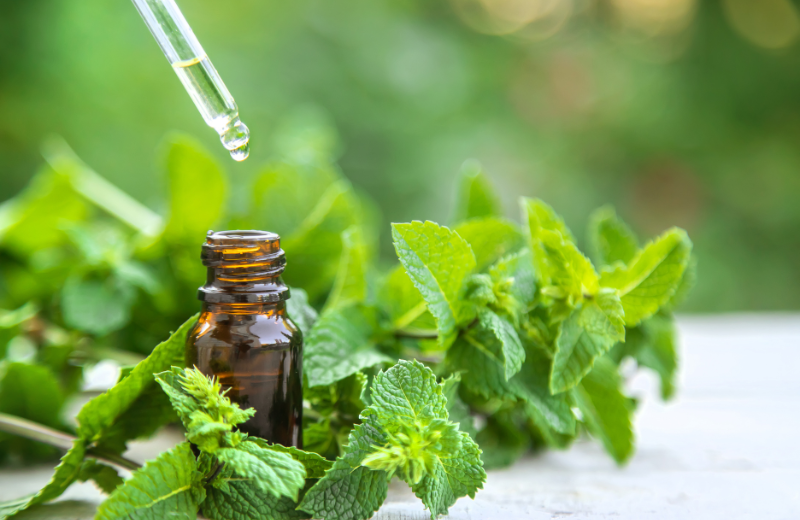
Peppermint oil is a powerful and invigorating essential oil that increases blood circulation to the scalp, helping to stimulate dormant hair follicles. It creates a cooling sensation that can wake up tired roots and encourage thicker, faster-growing hair.
Peppermint oil is especially useful for those experiencing hair thinning or patchiness, as it promotes scalp health and encourages growth at the root. It also helps reduce excess oil and itchiness, keeping the scalp clean and balanced. This essential oil can be used by mixing just a few drops with a carrier oil, as it’s quite potent. Consistent use over time can lead to visibly fuller and healthier-looking hair.
4. Tea Tree Oil – Deeply Cleansing and Ideal for Scalp Conditions
Tea tree oil is well known for its antibacterial and antifungal properties, which make it excellent for maintaining a clean, healthy scalp. By removing buildup and helping to prevent dandruff, it creates an environment where hair can grow more freely and with less irritation.
This oil is frequently used in essential oil combinations to tackle scalp issues while promoting natural growth. It’s also effective in reducing excess oil and flakiness, which can hinder healthy hair development. Tea tree oil is a key ingredient in many dandruff treatment blends due to its purifying effects. Add a few drops to your regular shampoo or dilute in a carrier oil for a weekly scalp massage.
5. Cedarwood Oil – Balancing and Strengthening for Thinning Hair
Cedarwood oil helps stimulate the scalp and regulate oil production, which can reduce hair fall and improve the strength of individual strands. It’s particularly helpful for those with oily or unbalanced scalps and is often used in hair loss routines. Its grounding, woody scent also makes it a pleasant addition to any hair blend.
Cedarwood is especially effective when combined with other oils like rosemary or lavender, forming a powerful mix that supports regrowth and resilience. If you’re targeting hair growth, this natural essential oil can be used once or twice a week in an oil treatment or added to a hair mask. Over time, it may help improve scalp health and support thicker, stronger hair.
6. Ylang Ylang Oil – Hydrating and Ideal for Dry, Brittle Hair
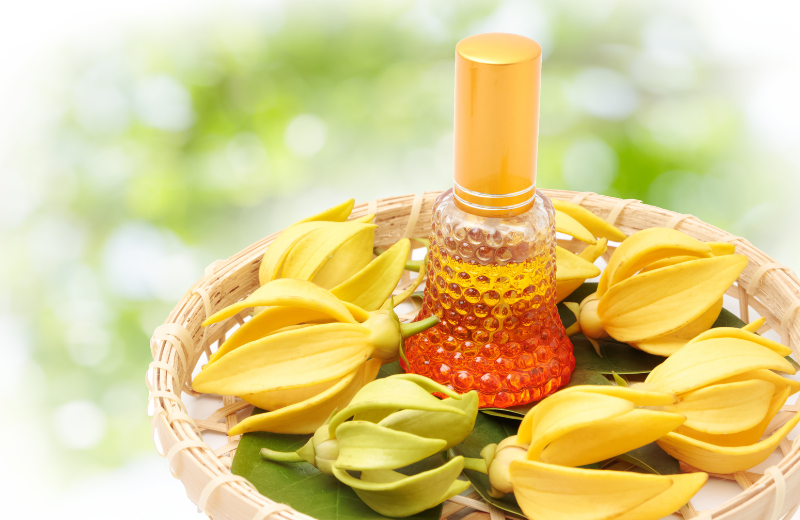
Ylang ylang oil is excellent for restoring moisture and shine to hair that’s dry, damaged, or prone to frizz. It helps stimulate the scalp’s natural oil production, making it especially beneficial for those with dry hair types.
By improving moisture levels, ylang ylang can reduce breakage and improve manageability, leaving hair feeling softer and looking shinier. It’s one of the best essential oils for hair growth, particularly if dryness is contributing to brittleness and breakage. This floral-scented oil works well in hot oil treatments or as part of a conditioning mask. It also blends nicely with coconut or olive oil for a deeply nourishing treatment.
7. Clary Sage Oil – Strengthening and Supportive for Hormonal Hair Loss
Clary sage essential oil contains linalyl acetate, a compound that helps balance scalp oils and support hair strength. It’s particularly beneficial for people experiencing hair loss due to hormonal shifts, including postpartum shedding or perimenopausal changes. Clary sage encourages stronger, thicker hair by improving follicle function and regulating oil levels. This makes it a good choice for both dry and oily scalps.
Many people use it in essential oil blends to complement other growth-supporting oils. It can be massaged into the scalp weekly, often alongside lavender or rosemary for a multi-benefit approach.
8. Chamomile Oil – Gentle, Calming, and Adds Natural Shine
Chamomile oil is known for its calming and anti-inflammatory properties, which makes it ideal for people with sensitive or irritated scalps. It helps soothe itching, reduce redness, and support overall scalp comfort while also conditioning the hair. Chamomile is often used as a natural oil for dandruff treatment because it helps relieve dryness without being harsh.
In addition to soothing benefits, it can enhance the natural highlights in lighter hair shades and boost shine. Chamomile oil works well when added to a leave-in conditioner or blended with almond oil for a gentle scalp massage. With regular use, it can help promote a more comfortable scalp and shinier, healthier strands.
9. Thyme Oil – Stimulating and Excellent for Hair Thickness
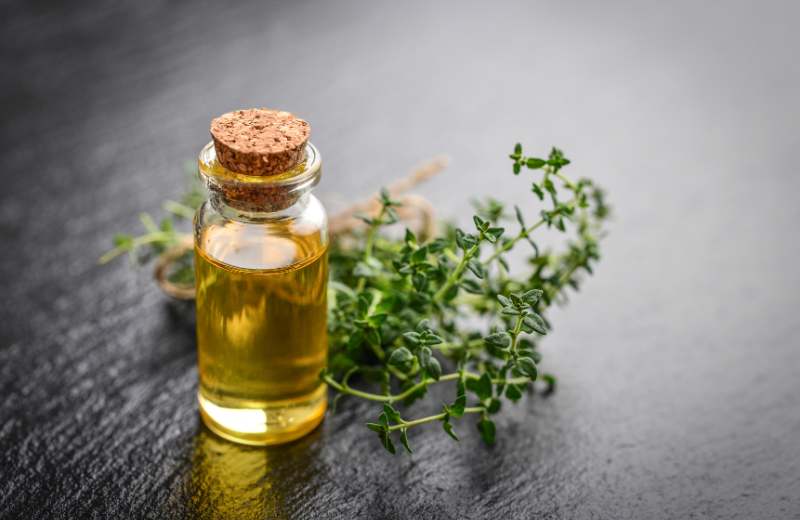
Thyme essential oil is rich in antioxidants and helps promote circulation, making it a good choice for encouraging new hair growth and improving thickness. It’s particularly useful in addressing early signs of hair thinning or patchy areas, supporting the follicles through increased blood flow.
Thyme is quite potent, so only a small amount is needed to see results. It blends well with oils like rosemary or tea tree to create an effective solution for those looking to regrow or strengthen their hair. Thyme is often found in blends focused on stimulating the scalp. Use it sparingly and always diluted in a carrier oil to avoid irritation.
10. Geranium Oil – Balancing and Ideal for Scalp and Shine
Geranium oil helps balance oil production and improve circulation, which supports a healthier scalp and improved hair growth over time. It’s especially beneficial for those with oily roots and dry ends, helping to even out sebum levels and restore harmony to the scalp. Geranium also strengthens hair strands and enhances shine, making hair look and feel healthier.
This oil is commonly used in essential oil hair blends and natural treatments for its wide range of benefits. Adding a few drops to your shampoo or conditioner can make your everyday routine more nourishing. It also combines well with lavender and cedarwood in DIY oil mixes.
11. Bergamot Oil – Uplifting and Clarifying for a Healthy Scalp
Bergamot essential oil offers a combination of antibacterial, anti-inflammatory, and mood-lifting properties, making it a beneficial addition to your hair care routine. It helps cleanse the scalp, reduce buildup, and create an optimal environment for natural hair growth. Its refreshing citrus scent also brings an uplifting quality to hair treatments.
Bergamot oil supports hair strength by soothing scalp irritation and promoting circulation, which helps deliver nutrients to the follicles. It’s a helpful option for those exploring essential oils that are good for hair, and seeking natural solutions for hair fall. Blend a few drops with a carrier oil such as sweet almond or grapeseed and apply it as a pre-shampoo treatment once a week for balanced, revitalised hair.
Recommended for you!
Best SellersFrequently Asked Questions About Essential Oils for Hair Health and Growth
What essential oil is best for hair?
Rosemary is often considered the top choice for growth, while lavender, peppermint, and tea tree are great for scalp health. These oils help by boosting circulation, reducing inflammation, and supporting follicle function over time.
Can essential oils help with thinning hair?
Essential oils, especially peppermint, rosemary, and cedarwood, can help with thinning hair. They stimulate the scalp and encourage regrowth by improving blood flow and creating a healthier environment for follicles to thrive.
How often should I oil my hair?
One to two times a week is enough for most people. This frequency supports hair health without overwhelming the scalp or causing product buildup.
How can I mix essential oils for hair growth and thickness?
Start with a carrier oil base. Add 2 drops each of rosemary, lavender, and peppermint. Massage into the scalp and leave for 30–60 minutes before washing. Regular use of this blend can help improve hair density and condition.
Which oil is best for regrowth and thickness?
A blend of rosemary, peppermint, and cedarwood is particularly effective for regrowth and improved thickness. These oils work together to strengthen the follicles and promote healthier hair.
What oils should not be used on hair?
Avoid essential oils like cinnamon, clove, and oregano on the scalp as they can be highly irritating. Always do a patch test and use proper dilution to prevent adverse reactions.
Can I leave essential oils in my hair without washing it?
You can leave diluted essential oils in your hair overnight, provided your scalp tolerates them well. Rinse thoroughly in the morning to avoid buildup or sensitivity.
Which oil helps stop hair breakage?
Ylang ylang and argan oil are excellent for reducing breakage, as they deeply hydrate and protect the hair shaft. Including them in your routine can help strengthen dry, brittle strands.
What essential oil is best for frizzy hair?
Chamomile and ylang ylang work well for smoothing frizz and adding softness. They help condition the hair naturally and reduce dryness that leads to flyaways.
What’s the most hydrating hair oil?
Argan oil is considered one of the most hydrating oils for hair. It penetrates deeply and helps retain moisture, leaving hair smoother and more manageable.
Study our Essential Oils Business Diploma for £29
Interested in turning your passion for essential oils into something more? Learn how to create blends, treatments and a business with the Essential Oils Business Diploma Course from Centre of Excellence. For a limited time, you can enrol for just £29. Whether you want to support others or deepen your own knowledge, it’s the perfect next step.


